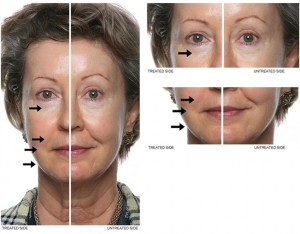To continue the topic on Nu Skin Enterprises in the last blog, this time, I would like to talk about the marketing techniques used in the promotion. Continuing the example of the case in China, Nu Skin Company in China gives training to their direct consumers – people who buy products directly from Nu Skin company and sell the products to others. One of the most important parts of training these sellers is to teach them how to promote and sell the products through social media. The promoting posts written by different sellers but are surprisingly almost the same. Basically, pictures of users’ BEFORE and AFTER (as shown in the picture at the bottom) and their good comments is a must in the post. And then, the sellers sometimes post some pictures showing that some movie stars or singers were buying or bought the Nu Skin products. According to the seven principles we learned in the marketing class, it is obvious that social valuation and authority principle are the main tools they used. Social valuation, people tend to follow the majority doing which eventually became social effects. If the majority says the product is good, then consumers tend to believe the product is good since most people are saying the same thing. Authority principle says that people tend to respect people who are better than them. Of course, these two are not the only techniques the sellers used in their promoting post. Other techniques are recognized as pseudoscience marketing techniques which may fool people to believe advertisements, such as the creation of “phantom” goal (extreme claims without evidence). Someone may say “so what” because he or she has never ever been fooled by these ads. But if we put ourselves in the shoes of most nowadays consumers, we can easily see how powerful these ads are and how useful these techniques are. Compared to the generations which our parents and grandparents are in, we will see that our generation are not as rational as theirs. We rarely think deeper before doing purchases. Therefore, we easily believe the exaggerated words in the ads.
Paula Luo's blog
Just another UBC Blogs site

